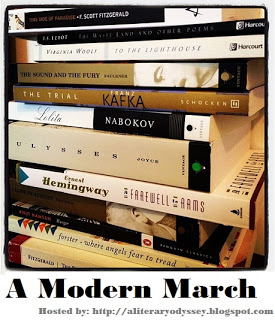The Waste Land
 "The Waste Land," by T. S. Eliot
"The Waste Land," by T. S. EliotFor Modern March I promised myself that I would read T. S. Eliot's poem "The Waste Land." I actually read it way back at the beginning of the month, but like a good classical student I read it 3 times, which took a while. I used this annotated copy, which was very helpful. First I read it straight through without much preparation, then I read it with all the notes, and then I read it through again, keeping the notes in mind. It was hard work! I'm not really a poetry person, and I'm especially not a modernist poetry person.
The poem is thickly allusive, so that every line refers to something else. Lots of mythology, literature, songs, all sorts of things. There is a lot about birds, and water.
Many different voices say things, and they mostly seem to be women. Women keep showing up in similar circumstances; they are tired and used by men who have no interest in their welfare. (Even Eliot's wife makes a small appearance, but I don't know that I should try to link those two elements.)
There are references to people walking through London, and I found out that you can actually map out a bit of a route, across London Bridge and around several streets. London and the Thames are a major part of the poem. Since it's also supposed to be about the Fisher King, a wounded king whose land was wasted until he was healed (and who was assimilated into the Arthurian legends), I would think that those elements go together a bit--London/Thames/Logres and so on.
I cannot pretend to have even begun to understand "The Waste Land," but it was good for me to work on it. I do want to read "The Hollow Men" this month too, and eventually "The Four Quartets," but that last one is something of a future ambition.




I read The Waste Land years ago, as part of one of my ambitious reading pushes. Like you, I'm not much of a poetry reader. I find though, that once I start, I end up enjoying it more than I expected. Maybe I'll reread The Wasteland for April - it is poetry month after all :-)
ReplyDeleteI love The Waste Land!
ReplyDelete